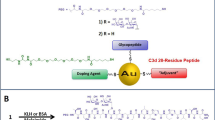Summary
A murine anti-(human gastric carcinoma) monoclonal antibody, GL-013 (IgG1), which reacts with a high-molecular-mass glycoprotein from colorectal tumour tissue [Yang and Price (1989) Anticancer Res 9: 1707], was examined for reactivity against a panel of purified and partially purified antigens associated with tumours of the gastrointestinal tract. These included carcinoembryonic antigen (CEA), normal cross-reacting antigen, Y-hapten glycoproteins, and perchloric acid extracts and glycolipid preparations from colorectal tumours. While the GL-013 antibody failed to bind to these antigens, it was found to react strongly with synthetic peptides with sequences based upon that reported for the protein core of a human gastrointestinal mucin [Barnd et al. (1989) Proc Natl Acad Sci USA 86: 7159; Gum et al. (1989) J Biol Chem 264: 6480]. In control tests, a series of other anti-(colorectal tumour) antibodies (IgG1 and IgG3), with broad reactivity towards gastrointestinal carcinomas, as well as an anti-CEA antibody, (IgG1) failed to react with the synthetic peptides. It is concluded that the anti-(gastric carcinoma) monoclonal antibody GL-013 binds to a threonine-rich peptide epitope expressed within the protein core of gastrointestinal mucins.
Similar content being viewed by others
References
Barnd DL, Lan MS, Metzgar RS, Finn OJ (1989) Specific, major histocompatibility complex-unrestricted recognition of tumour-associated mucins. Proc Natl Acad Sci USA 86: 7159
Brown A, Feizi T, Gooi HC, Embleton MJ, Picard JK, Baldwin RW (1983) A monoclonal antibody against human colonic adenoma recognizes difucosylated type-2 blood group chains. Bioscience Rep 3: 163
Burchell J, Taylor-Papadimitriou J, Boshell M, Gendler S, Duhig T (1989) A short sequence within the amino acid tandem repeat of a cancer-associated mucin, contains immunodominant epitopes. Int J Cancer 44: 691
Ellis IO, Robins RA, Elston CW, Blamey RW, Ferry B, Baldwin RW (1984) A monoclonal antibody, NCRC-11, raised to human breast carcinoma: I. Production and immunohistological characterization. Histopathology 8: 501
Gendler S, Taylor-Papadimitriou J, Duhig T, Rothbard J, Burchell J (1988) A highly immunogenic region of a human polymorphic epithelial mucin expressed by carcinomas is made up of tandem repeats. J Biol Chem 263: 12820
Geysen HM, Rodda SJ, Mason TJ, Tribbick G, Schoofs PG (1987) Strategies for epitope design using peptide synthesis. J Immunol Methods 102: 259
Gum JR, Byrd JC, Hicks JW, Toribara NW, Lamport DTA, Kim YS (1989) Molecular cloning of human intestinal mucin cDNAs. J Biol Chem 264: 6480
Jensenius JC, Williams AF (1974) The binding of anti-immunoglobulin antibodies to rat thymocytes and thoracic duct lymphocytes. Eur J Immunol 4: 91
Kenemans P, Bast RC, Yemeda CA, Price MR, Hilgers J (1988) Mucins and mucin-like antigens as circulating tumor markers. In: Hilgers J, Zotter S (eds) Cancer reviews, vols. 11, 12. Munksgaard, Copenhagen, p 119
Krupey J, Wilson T, Freedman SO, Gold P (1972) The preparation of purified carcinoembryonic antigen of the human digestive system from large quantities of tumour tissue. Immunochemistry 9: 617
Kufe D, Hayes D, Abe M (1988) Monoclonal antibody assays for breast cancer. In: Kupchik HZ (ed) Cancer diagnosis in vitro using monoclonal antibodies. Immunology series, vol 39. Dekker, New York, p 67
Magnani JL, Brockhaus M, Smith DF, Ginsburg V, Blaszczyk M, Mitchell KF, Steplewski Z, Koprowski H (1980) A monosialo-ganglioside is a monoclonal antibody defined antigen of colon carcinoma. Science 212: 55
Price MR (1988) High molecular weight epithelial mucins as markers in breast cancer. Eur J Cancer Clin Oncol 24: 1799
Price MR, Brown A, Armitage NC, Baldwin RW (1985) Application of a micro-radioimmunoassay to the analysis of monoclonal antibody-defined epitopes on antigen preparations from human colonic cancer. IRCS Med Sci 13: 366
Price MR, Edwards S, Baldwin RW (1986) Association of the Y hapten with glycoproteins, glycolipids and carcinoembryonic antigen in colorectal carcinoma. Cancer Lett 33: 83
Price MR, Crocker G, Edwards S, Nagra IS, Robins RA, Williams M, Blamey RW, Swallow DM, Baldwin RW (1987) Identification of a monoclonal antibody defined breast carcinoma antigen in body fluids. Eur J Cancer Clin Oncol 23: 1169
Price MR, Edwards S, Jacobs E, Pawluczyk IZA, Byers VS, Baldwin RW (1987) Mapping of monoclonal antibody defined epitopes associated with carcinoembryonic antigen. Cancer Immunol Immunother 25: 10
Price MR, Clarke AJ, Robertson JFR, O'Sullivan C, Baldwin RW, Blamey RW (1990) Detection of polymorphic epithelial mucins in the serum of systemic breast cancer patients using the monoclonal antibody, NCRC-11. Cancer Immunol Immunother 31: 269
Swallow DM, Gendler S, Griffiths B, Corney G, Taylor-Papadimitriou J, Bramwell M (1987) The tumour-associated epithelial mucins are coded by an expressed hypervariable gene locusPUM. Nature 327: 82
Yang G-Y, Price MR (1989) Analysis of monoclonal antibodies for the identification of antigens associated with tumours of the gastrointestinal tract. Anticancer Res 9: 1707
Author information
Authors and Affiliations
Additional information
Present address: Cancer Research Institute, China Medical University, Shenyang, Liaoning, People's Republic of China
Rights and permissions
About this article
Cite this article
Price, M.R., Sekowski, M., Yang, G.Y. et al. Reactivity of an anti-(human gastric carcinoma) monoclonal antibody with core-related peptides of gastrointestinal mucin. Cancer Immunol Immunother 33, 80–84 (1991). https://doi.org/10.1007/BF01742533
Received:
Accepted:
Issue Date:
DOI: https://doi.org/10.1007/BF01742533




